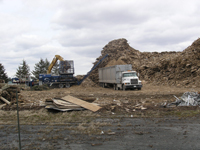
Features
Energy
Management
A ‘greener’ greenhouse: In addition to fuel bill savings, there may be some tax breaks
July 7, 2008 By Brian Blommaert
WEB EXCLUSIVE
A ‘greener’ greenhouse: In addition to fuel bill savings, there may be some tax breaks
Energy costs account for
approximately 40 per cent of the total production costs for a
greenhouse operation. With natural gas and bunker oil prices
continually increasing, even the most conservative of greenhouse
growers is considering alternative energy sources. The alternative
energy choices include coal but there is always concern about the
status in the long term of the exemption for the use of coal.
The green energy choices currently available include:
- Boilers fired by waste wood, municipal waste (garbage), methane or bio-oils.
- Anaerobic digesters.
- Cogeneration and trigeneration systems.
 |
| Author Brian Blommaert; (top) waste wood processing at Rosa Flora Limited near Dunnville, Ontario. |
 |
When you evaluate each option, you will find there is a significant fuel cost savings but a large capital investment is required to convert to an alternative energy choice. There are tax savings and programs available to offset these costs.
The tax savings are in the form of faster deductions for capital expenditures and immediate deductions for certain soft costs that would normally be non-deductible or would be required to be capitalized and deducted over a long period of time.
TAKE TIME TO RESEARCH POSSIBLE TAX SAVINGS
Capital: Many alternative energy options will qualify for an accelerated depreciation class. The main accelerated depreciation class is Class 43.2. These assets are deducted at a rate of 50 per cent per year on a declining balance basis. Normally, these assets would be deducted at a rate of between four per cent and 20 per cent.
The equipment used in the green energy options described above, that was purchased after February 22, 2005, and before 2020 is generally eligible for Class 43.2. The one exception is for cogeneration and trigeneration equipment that has an annual heat rate from fossil fuel in excess of 4,750 BTUs per kilowatt-hour of electricity produced. Buildings to house the equipment and waste storage facilities are specifically excluded as eligible assets.
Soft Costs: If you have a project where it is reasonable to expect that 50 per cent or more of the capital of the project will be eligible for Class 43.1 or Class 43.2, the soft costs of the project may be fully deductible. The soft costs for such a project would be eligible as a Canadian Renewable and Conservation Expense (CRCE). CRCE expenses can be deducted immediately or carried forward indefinitely.
Soft costs that would normally qualify for CRCE treatment include:
- Pre-feasibility studies.
- Feasibility studies.
- Site approval costs.
- Land clearing necessary for the project.
- Construction of a temporary road to the site.
- Costs for the training of operators/maintenance personnel.
- Costs for the commissioning and start up of the plant.
The costs for the acquisition of land, administration and management expenses, and amounts paid to non-residents and expenditures that may be claimed as a Scientific Research & Experimental Development (SR&ED) expense generally do not qualify for CRCE treatment, but may be deductible under another provision of the Income Tax Act, Canada.
To be eligible for CRCE treatment, the costs must be arm’s length costs (cannot be paid to a related person or related corporation). CRCE costs can still be claimed if the project was abandoned due to factors that were not foreseen in the initial stages of development.
OTHER PROGRAMS INCLUDE ‘BIOFUELS OPPORTUNITIES’
SR&ED: The mere implementation of an existing technology is not considered SR&ED. The early adopters of green energy will tell you that there is a significant amount of experimentation that takes place when you need to adapt a technology for use in your business. There may be opportunities for SR&ED claims through the implementation of a green energy technology in your operation.
Federal Programs: The ecoAgriculture Biofuels Capital Initiative (ecoABC) is a four-year, $200 million federal program ending on March 31, 2011, that provides repayable contributions for the construction or expansion of transportation biofuel production facilities. The funding is conditional upon agricultural producer investment in the biofuel projects, and the use of agricultural feedstock to produce the biofuel.
The Biofuels Opportunities for Producers Initiative (BOPI) is an initiative under the Advancing Canadian Agriculture and Agri-Food (ACAAF) Program. It is designed to help farmers and rural communities hire experts who can assist in developing business proposals and undertake feasibility and other studies necessary to create and expand biofuels production capacity involving significant (greater than one-third) ownership by agricultural producers.
SPECIALIZED PROGRAMS OFFERED BY THE PROVINCES
British Columbia has recently introduced a carbon tax on fuels based on their CO2 emissions. Biofuels and renewable energy are exempt from the carbon tax.
Ontario has the Current Cost Adjustment (OCCA) that provides for an additional 30 per cent deduction for equipment utilized to prevent, reduce or eliminate water or air pollution. The 30 per cent deduction is applied against Ontario taxable income only and does not reduce the undepreciated capital cost of the equipment.
CONSUMERS ARE DICTATING NEW ENVIRONMENTAL GOALS
The environment and what companies are doing to protect the environment has garnered attention recently. Many large companies are implementing environmentally friendly programs as part of their corporate responsibility. Companies like Wal-Mart have begun to push down to their suppliers looking for reductions in the overall carbon output for its products.
As always, consultation with a tax professional should form part of your decision-making process.
- Brian Blommaert is a senior tax manager with the Windsor office of Deloitte. 519-967-7746, bblommaert@deloitte.ca
Print this page